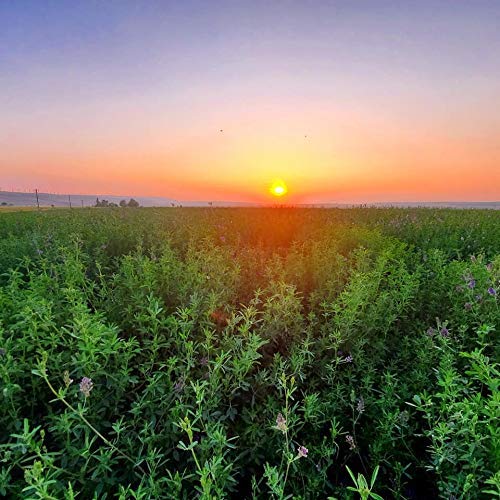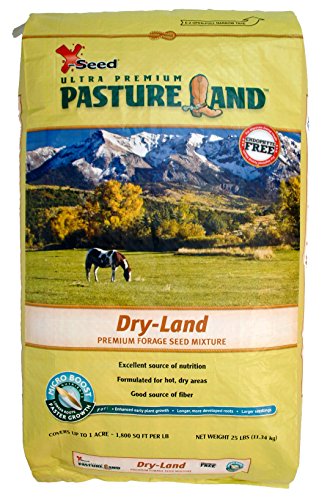If you’re looking for a lush hay field, the right seed is crucial. The right seed can optimize your hay yield, save valuable time and energy, and protect your investment in your land. Before buying seeds for a hay field, however, there are some essential factors you should consider.
First, it’s essential to consider your local climate and soil. Different seeds thrive in different conditions. Know your area’s precipitation levels and soil pH to identify suitable seed varieties. You should also consider the purpose of the hay you’re growing, as different animals prefer different types of hay.
Secondly, consider the quality of seeds. The seed’s purity and germination rate have a significant impact on yield and productivity. Check the seed’s origin, age, and weight before making your purchase.
Lastly, consider the sustainability of the seed. Look for seeds that are bred with sustainability in mind. Sustainable seeds are not only better for the environment but can also lower your long-term cost of maintenance.
Ready to start your hay field project? Here are some questions to consider: What is the primary purpose of my hay field? What’s my local climate and soil type? What quality and sustainability aspects are most critical to me? With these answers, you can select the perfect seed and start enjoying a beautiful, productive hay field.
10 Best Seed For Hay Field
| # | Product Image | Product Name | Product Notes | Check Price |
|---|---|---|---|---|
|
1
|
It is ideal for garden seed, cover crop, field growing, alfalfa hay, and alfalfa honey production.
|
|
||
|
2
|
This product is ideal for gardening, cover crops, field growing, hay production, honey production, and food plots.
|
|
||
|
3
|
The product is ideal for planting as a cover crop or for field growing, producing alfalfa hay and alfalfa honey.
|
|
||
|
4
|
This product is ideal for garden seed, cover crop, field growing, alfalfa hay, alfalfa honey, and food plot.
|
|
||
|
5
|
The product is ideal for use as a regenerative cover crop, field growing, alfalfa hay, or alfalfa honey.
|
|
||
|
6
|
Ideal for creating a sustainable and nutrient-rich pasture for livestock grazing, hay production, silage, and greenchop.
|
|
||
|
7
|
This product is ideal for creating a cool-season pasture with perennial climax Timothy grass.
|
|
||
|
8
|
Ideal for growing pasture and forage on dry land.
|
|
||
|
9
|
The product is ideal for overseeding and promoting healthy growth of grass and forage in pastures.
|
|
||
|
10
|
The product is ideal for spreading materials on a UTV, such as salt, sand or fertilizer.
|
|
1. Certified Clean Alfalfa Seeds – Premium Quality!
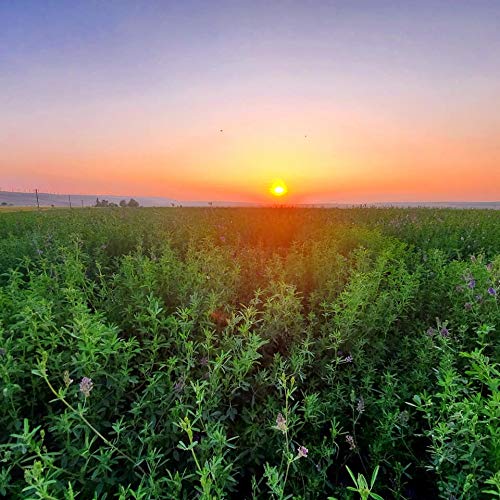
Looking for a regenerative cover crop that can help improve soil health and fertility? Check out Green Stripe Farms' Alfalfa Seed! This 10 lb bag of non-GMO, heirloom, and open-pollinated alfalfa seeds is perfect for gardening, field growing, cover crop, alfalfa hay, alfalfa honey, food plot, and chicken coop.
With a high germination rate and a new variety, you'll be able to grow healthy and nutritious alfalfa plants in no time! The seeds have an average maturity period of 60-70 days, making them perfect for perennial planting. Plus, the USDA Hardiness Zone rating of 2-9 ensures that they can thrive in a variety of climates.
Green Stripe Farms is a 4th generation alfalfa seed farm that specializes in producing premium quality alfalfa seeds. Their commitment to excellence and sustainability means that you can trust their products to be of the highest quality.
So why wait? Order your bag of Green Stripe Farms' Alfalfa Seed today and start improving your soil health and fertility!
- Non-GMO, heirloom, and open-pollinated alfalfa seeds
- High germination rate and new variety
- Suitable for gardening, field growing, cover crop, alfalfa hay, alfalfa honey, food plot, and chicken coop
- Perennial plant with a maturity period of 60-70 days
- USDA Hardiness Zone rating of 2-9
- Produced by a 4th generation alfalfa seed farm
2. Certified Weed-Free Premium Alfalfa Seeds
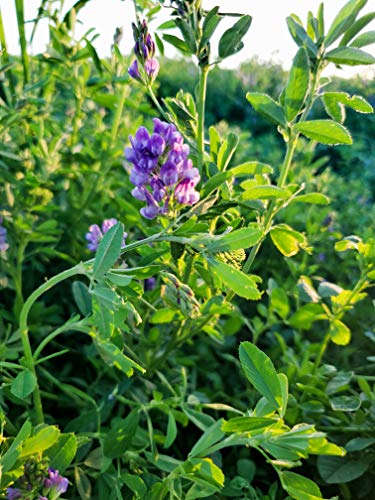
The Alfalfa Seed is a versatile crop that can be used as a food plot, cover crop, or even grown in your garden. This non-GMO, heirloom, and open-pollinated seed is grown in the USA, ensuring high-quality and sustainable farming practices. It has a high germination rate and is easy to seed, making it a popular choice for gardening, field growing, hay production, honey production, deer cover, and chicken coops.
The Alfalfa Seed can reach full maturity in 60-70 days and is a perennial crop that can thrive in USDA Hardiness Zones 2-9. This Regenerative Cover Crop is perfect for farmers and gardeners who want to improve soil health and prevent erosion. The Alfalfa Seed is shipped directly from a 4th generation Alfalfa Seed Farm in the USA, ensuring fresh and premium quality seeds.
The Alfalfa Seed has a lot of benefits including its versatility, high germination rate, and easy seeding process. Its perennial nature and adaptability to different hardiness zones make it a long-lasting and reliable crop. Its use as a regenerative cover crop can improve soil health and prevent erosion, while also attracting deer for feeding. The Alfalfa Seed is also perfect for chicken coops, providing a nutritious source of food for chickens.
Overall, the Alfalfa Seed is a great choice for anyone looking for a versatile and sustainable crop. Its high-quality and regenerative properties make it a popular choice for farmers and gardeners alike.
- Non-GMO, Heirloom, Open Pollinated
- High Germination Rate
- Easy to Seed
- Versatile Crop
- Regenerative Cover Crop
- Improves Soil Health and Prevents Erosion
- Perennial Crop
- Attracts Deer for Feeding
- Perfect for Chicken Coops
3. Weed-Free Alfalfa: Premium 2lbs For High-Fertility Crops.
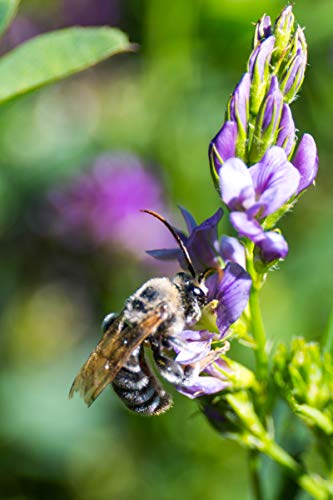
If you're looking for a cover crop that can help regenerate soil, suppress weeds, and attract bees, then look no further than Green Stripe Farms Premium Quality Alfalfa Seeds. These seeds are perfect for gardening, field growing, cover crop, alfalfa hay, and alfalfa honey. With a fast maturity of only 60-70 days, these seeds are perfect for those who want to see results quickly. Not only that, but alfalfa is a perennial, which means it will come back year after year, making it a great long-term investment for your garden or farm. These seeds are also USDA hardiness zone 2-9, making them suitable for a wide range of climates. And with four generations of experience behind them, you can trust that these seeds are of the highest quality.
Planting alfalfa has many benefits, including fixing nitrogen into the soil, which can improve soil fertility and health. Additionally, alfalfa can attract bees, which are crucial for pollination. With the ability to suppress weeds, alfalfa can also help reduce the need for herbicides, making it an eco-friendly choice for any gardener or farmer. And with Green Stripe Farms Premium Quality Alfalfa Seeds, you can be confident that you're getting the best possible product.
- Fast maturity of 60-70 days
- Perennial plant that comes back year after year
- Fixes nitrogen into the soil, improving soil fertility and health
- Attracts bees for pollination
- Suppresses weeds, reducing the need for herbicides
- Suitable for a wide range of climates (USDA hardiness zone 2-9)
- Four generations of experience behind the product
4. Regenerative Alfalfa: Premium Non-Gmo Seeds
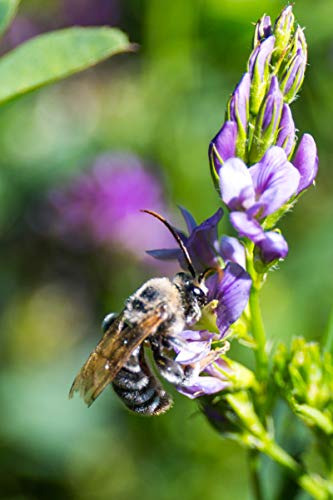
The Green Stripe Farms Premium Quality Alfalfa Seeds are an excellent choice for those who are looking for a regenerative cover crop. The seeds are available in bulk, making them a great option for those who need a large quantity. These seeds are non-GMO, heirloom, and open-pollinated, ensuring that they are of high quality and are free from any genetic modifications.
The high germination rate of these seeds ensures that they will grow into healthy plants with minimal effort. They are a new variety that is suitable for gardening, field growing, alfalfa hay, alfalfa honey, food plot, and chicken coop. They take approximately 60-70 days to reach full maturity and are a perennial plant that can thrive in USDA Hardiness Zone 2-9.
The Green Stripe Farms is a 4th generation alfalfa seed farm that ensures premium quality in every seed that they sell. The seeds are carefully harvested to ensure maximum quality and germination rate. These seeds are perfect for those who want to grow a healthy and vibrant crop that can benefit the soil and the environment.
- Non-GMO, heirloom, and open-pollinated seeds ensure high quality and are free from genetic modifications
- High germination rate ensures healthy plants with minimal effort
- Suitable for gardening, field growing, alfalfa hay, alfalfa honey, food plot, and chicken coop
- Takes approximately 60-70 days to reach full maturity and is a perennial plant
- Can thrive in USDA Hardiness Zone 2-9
- The Green Stripe Farms is a 4th generation alfalfa seed farm that ensures premium quality in every seed that they sell
5. Perennial Orchard Grass Seed Blend – 25lbs.
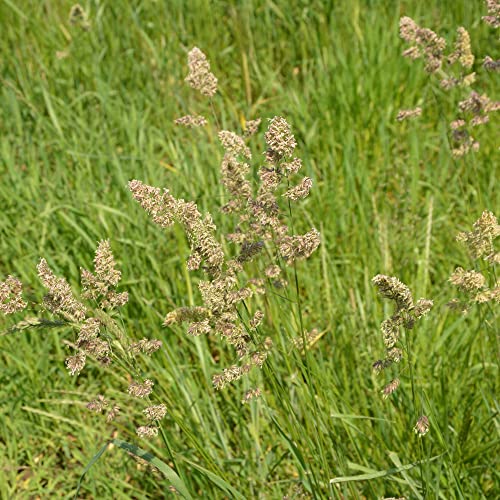
The Grazer Orchard Grass Blend is a mixture of early, medium, and late maturing varieties of orchard grass pasture seed. Orchard grass is a drought and shade tolerant grass that is indigenous to Europe and grows well in regions with moderate to high rainfall and warm summers. It is a winter-hardy grass after establishment and starts growing early in the spring as the temperature increases, and it forms new tillers. However, this growth rate decreases as the days become shorter in the fall. Orchard grass is more heat tolerant than Timothy pasture grass but less than tall fescue.
The Grazer Orchard Grass Blend is an ideal option for those who are looking for a stem-free grass under dry conditions. This blend is less aggressive towards other grasses and is perfect under hay, silage, and proper grazing management. The seeding rate for this blend is 25-30 lbs per acre in spring or fall depending on irrigation and geographic location.
- Contains a mixture of early, medium, and late maturing varieties of orchard grass pasture seed
- Drought and shade tolerant grass
- Winter-hardy grass after establishment
- Ideal option for stem-free grass under dry conditions
- Less aggressive towards other grasses
- Perfect for hay, silage, and proper grazing management
6. Outsidepride Perennial Climax Timothy Cool Season Pasture Grass Seed – 25 Lbs
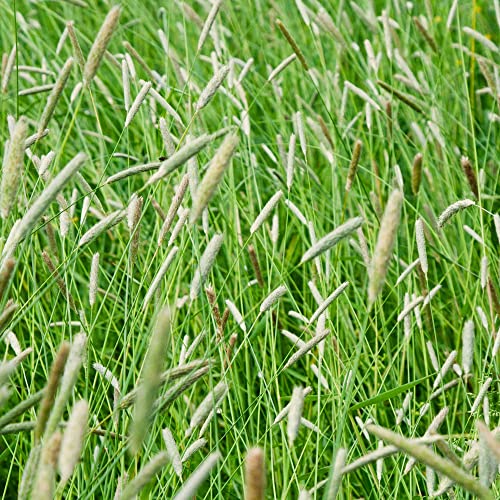
Timothy is a popular grass in the United States known for being one of the earliest grasses. It is a short-lived and winter-hardy perennial bunchgrass that is often seeded with other plants like alfalfa, clover, or birdsfoot trefoil. This grass is highly adaptable to high elevations and areas with at least 18 inches of annual rainfall. Timothy is well known to be prime horse hay crop.
This perennial cool-season grass is best adapted to cool, humid climates. Its improved cultivars bloom and head up 7-10 days earlier than other species. Timothy normally matures later than tall fescue, orchardgrass, and smooth bromegrass. Timothy is highly productive, rust-resistant, and has a wide adaptation. It is well-suited for fertile, moist, medium-heavy soils of the Pacific Northwest, Great Lakes, and New England states.
Timothy is easy to establish and handle for hay, making it an ideal grass for late-spring grazing or for hay harvesting since the climate is more favorable for curing. It is very palatable and is often selectively grazed, but it can be intolerant of intensive grazing during certain stages of its development. Seed at 10-15 lbs per acre for optimal growth.
- Adaptable to high elevations and areas with at least 18 inches of annual rainfall
- Well known as prime horse hay crop
- Highly productive, rust-resistant, and has wide adaptation
- Easy to establish and handle for hay
- Ideal grass for late-spring grazing or hay harvesting
- – Intolerant of intensive grazing during certain stages of development
7. X-Seed 440fs0021uct185 Land Over-Seeder Pasture Forage Seed, 25-Pound , Green
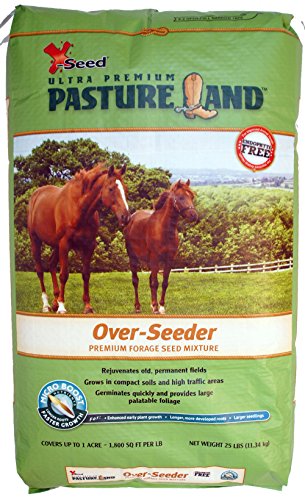
Looking for a solution to enhance the germination of your seeds and create larger seedlings? Consider Micro-Boost, a powerful formula that rejuvenates old, permanent fields. This product is specially designed to promote the growth of healthy and strong plants, thanks to its unique blend of 15-percent Maximo intermediate ryegrass, 20-percent Orchard grass, 3-percent clover, 49-percent gulf annual ryegrass, and 13-percent intermediate ryegrass. What's more, it is completely endophyte-free, which means it is safe for both humans and animals.
One of the key benefits of using Micro-Boost is that it helps to develop longer and more fibrous roots in your plants. This is essential for ensuring that they can absorb more nutrients and water from the soil, which in turn will help them to grow faster and stronger. Additionally, this product covers up to one acre, making it a cost-effective solution for large-scale farming operations.
Overall, if you want to improve the quality of your crops and maximize your yields, Micro-Boost is a great choice. With its blend of high-quality grasses and clover, it provides your plants with the nutrients they need to thrive.
- Promotes germination and creates larger seedlings
- Develops longer and more fibrous roots
- Rejuvenates old, permanent fields
- Endophyte-free and safe for humans and animals
- Covers up to one acre, making it a cost-effective solution for large-scale farming operations
8. Buyers Products Utvs16 Utv All Purpose Spreader With Mount , Black , 33 Inch
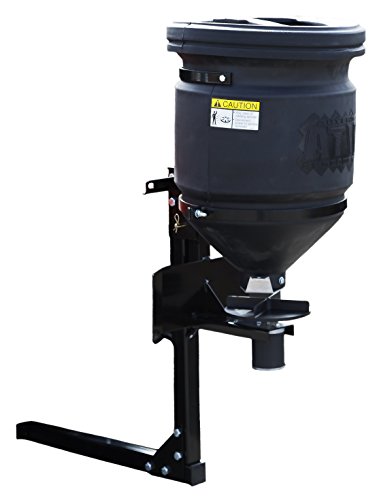
The Receiver Mount UTV All Purpose Spreader is a must-have equipment for your UTV, allowing you to convert it into a landscaping tool with ease. This versatile spreader can distribute free-flowing materials such as salt, fertilizer, seed, feed, and more. With a spread width of up to 30 feet, this spreader is an ideal choice for commercial and residential use.
Made of durable poly, the hopper of this spreader can hold up to 15 gallons of material, making it perfect for large-scale operations. The spreader is rust-proof, ensuring long-lasting use. The spreader is easy to attach with a 2-inch receiver hitch and features a sealed 12V motor and adjustable shut-off gate, making it easy to control the flow of material.
Buyers Products is a brand that offers more than just parts. From snow and ice equipment to toolboxes, hydraulics, towing, truck and trailer hardware, and innovative lighting products, they have a wide range of products that cater to various needs. They are committed to providing exceptional products and services that meet the needs of their customers.
Buyers Products has been in the truck equipment industry since 1946 and has become a leader in this field. They design their products keeping the user's requirements in mind, making them reliable and durable. Their team of engineers and experts work hard to ensure that their products meet the highest standards of quality.
With the Receiver Mount UTV All Purpose Spreader, you can rest assured that you are getting a durable, reliable, and versatile product that is perfect for your UTV. Whether you need to distribute salt, fertilizer, seed, feed, or any other free-flowing materials, this spreader is the perfect choice for you.
- Durable and rust-proof poly hopper
- Versatile with the ability to distribute free-flowing materials
- Easy to attach with a 2-inch receiver hitch
- Sealed 12V motor and adjustable shut-off gate for easy control
- Wide spread width of up to 30 feet
- Ideal for commercial and residential use
Best Seed For Hay Field FAQs
Can you mix different types of seeds for a hay field?
Yes, it is possible to mix different types of seeds for a hay field. In fact, it is recommended to do so as it can improve the overall quality of the hay and provide a variety of nutrients for the animals that will consume it. When selecting seeds to mix, it is important to consider factors such as soil type, climate, and intended use for the hay (i.e. forage or grazing). Some common seed options for hay fields include alfalfa, clover, timothy grass, and orchard grass. It is also important to ensure that the seeds are compatible with each other and will not compete for resources or hinder each other's growth. A consultation with a professional agronomist or agricultural extension agent can be helpful in determining the best seed mix for a specific hay field.
How do you prepare the soil for seeding a hay field?
Preparing the soil for seeding a hay field is an important process that directly impacts the quality and yield of the hay crop. The first step is to assess the soil's pH level and nutrient content to determine if any amendments are necessary. Adding lime or fertilizer can help balance the soil's pH level and provide essential nutrients for the hay crop to grow.
Next, the soil needs to be tilled to create a fine seedbed. This ensures that the hay seeds have good soil-to-seed contact, which is necessary for germination. It's important to remove any rocks or debris from the field to prevent damage to the equipment during the seeding process.
After tilling, the soil should be rolled or packed to create a firm seedbed. This helps prevent erosion and promotes good seed-to-soil contact. Finally, the hay seeds can be planted using a broadcast spreader or a drill. It's important to follow the recommended seeding rates for the specific type of hay being planted.
In summary, preparing the soil for seeding a hay field involves assessing the soil's pH and nutrient levels, tilling to create a fine seedbed, removing debris, packing the soil, and planting the seeds using the appropriate equipment and seeding rates. Proper soil preparation is essential for a successful hay crop.
How often should you reseed a hay field?
The frequency of reseeding a hay field depends on several factors such as soil type, weather conditions, and the type of grasses planted. In general, it is recommended to reseed a hay field every three to five years to maintain optimal productivity.
If the soil in the field is nutrient-deficient or has a high level of acidity, more frequent reseeding may be necessary. Additionally, if the grasses in the field are not performing well due to weed infestation or disease, reseeding may be necessary to restore productivity.
It is important to note that reseeding should be done during the appropriate season for the specific grasses planted in the field. For example, cool-season grasses should be reseeded in the fall or early spring whereas warm-season grasses should be reseeded in late spring or early summer.
Overall, regular monitoring of the hay field's productivity and condition can help determine when reseeding is necessary to maintain optimal yields and profitability.
What are the best types of seeds to use for a hay field?
When it comes to choosing the best types of seeds for a hay field, several factors need to be taken into consideration. Soil type, climate, and intended use of the hay are among the critical factors to consider. Generally, the best types of seeds to use for a hay field are those that are adapted to the local climate and soil conditions. Cool-season grasses like Timothy, Orchardgrass, and Kentucky Bluegrass are excellent choices for hay fields in cooler regions, while warm-season grasses such as Bermuda grass and Bahia grass are better suited for warmer climates. Legumes like Alfalfa and Clover are also popular choices for hay fields due to their high protein content, which makes them ideal for feeding livestock. It's essential to choose high-quality seed varieties that are resistant to disease and pests to ensure a successful harvest. Ultimately, the best type of seeds to use for a hay field depends on several factors, and it's crucial to consult with a local agricultural expert to make the right choice.
What is the recommended seeding rate for a hay field?
The recommended seeding rate for a hay field varies depending on a few factors such as the type of hay being grown, soil quality, and climate. Generally, the recommended seeding rate for cool-season grasses such as Timothy and Orchardgrass is between 10-12 pounds per acre. For legumes such as alfalfa, the seeding rate is usually around 8-10 pounds per acre. It is important to note that these rates are just a general guideline and may need to be adjusted depending on the specific conditions of the field. It is also recommended to use high-quality seed to ensure optimal growth and yield. Proper seedbed preparation, fertilization, and weed control are also crucial factors in the success of a hay field. Ultimately, consulting with a local agriculture expert can provide more specific recommendations based on the unique conditions of the field.


